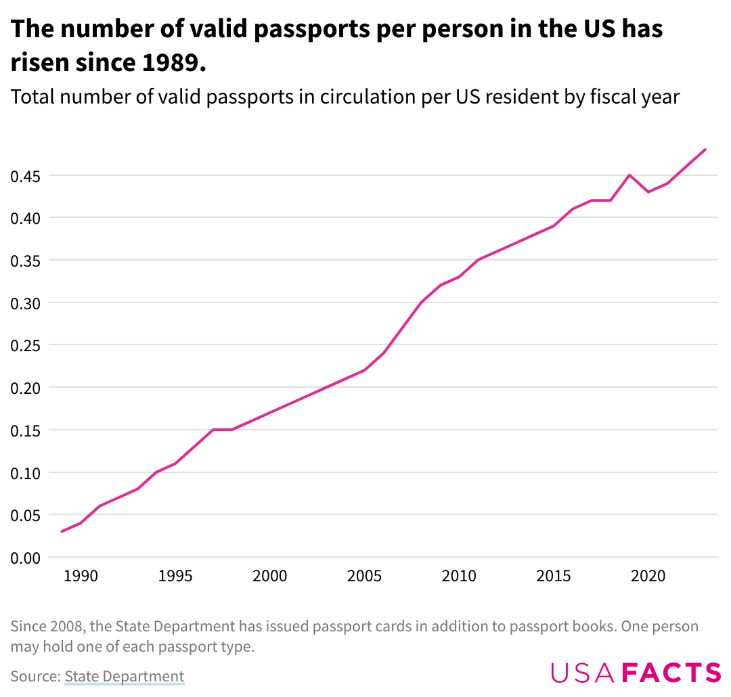Monday Links
Sports betting, passports, & more
1. The legalization of sports betting in a state causes a 28% increase in bankruptcies and an 8% increase in debt transferred to debt collectors. Banks restrict credit access in those states and lower credit card limits, and auto loan delinquencies rise considerably. Here’s the study, and here’s a Twitter thread with an overview of the findings.
2. If you’re going to bet on sports, try to avoid the U.S. Olympic men’s soccer team. This asterisk on their 1904 silver medal is both hilarious and sad.
3. In recent years, the price of cheaper brands grew between 1.3 and 1.9 times faster than the price of expensive brands. This definitely made inflation feel worse for consumers than the average rate of inflation would suggest (nowhere to retreat). Some call this “cheapflation.”
4. In 1989, just 3% of the U.S. population had a passport. As of 2023, 48% of the population had a passport. This is partially due to a change that required passports to go to Canada or Mexico starting in 2007, but the upward trend here is obvious and is a strong sign of increasing prosperity.
5. A study had about 2,400 U.S. adults wear a surgical mask while in public for two weeks and compared them to 2,300 U.S. adults who didn’t. The group wearing the masks had a 30% reduction in respiratory virus symptoms. That sounds like a large effect (and it is!), but it equates to only a 3.3 percentage point decrease in the odds of getting sick (8.9% for the masked vs. 12.2% for the unmasked).
6. A machine learning model trained with arrest and victimization data from the Chicago Police Department can pretty accurately predict the odds that someone gets shot. “Of the 500 people with the highest predicted risk, almost 13 percent are shot within 18 months, a rate 128 times higher than the average Chicagoan.” This very much evokes Minority Report.
7. I’m not particularly knowledgeable about the Hollywood socialite scene, but I can’t imagine anything worse than a “catastrophic” diarrhea incident at a celebrity’s home.
8. The number of kids aged 0-4 has fallen just about everywhere since the start of the pandemic, but it’s really plummeted in cities. As the parent of a 0-4 year old living in a city, I wonder how much of this is due to work from home, the need for a home office, and the difficulty getting a four bedroom house in an urban area.
9. Researchers found no indication that the closure of rural obstetric units negatively effects maternal or infant health, and “the evidence suggests that maternal health outcomes may have improved slightly” due to mothers traveling farther but to better hospitals for care. Not an intuitive finding.
10. A Missouri woman was freed from prison after serving 43 years for a murder she didn’t commit. This is why I’m opposed to the death penalty—it’s not that some people don’t deserve to die, it’s that the death penalty is permanent. In cases of wrongful conviction, at least we can release the person and give them a couple million dollars to try to make up for it.
11. A huge study unconditionally gave 1,000 people in Chicago and Dallas $1,000/month for three years and compared them to a control group of 2,000 people receiving $50/month. The groups were compared along twelve categories ranging from crime to health to employment to time use.
The people receiving $1,000/month were slightly less likely to work and worked fewer hours, and that time was instead mostly spent on leisure. Most other results were also underwhelming.
Two immediate takeaways here. First, this study is awesome, and thorough, and remarkably well done. Second, the findings here are pretty disappointing for universal basic income. You can read more in this thread.
12. BP’s Energy Outlook 2024 includes two scenarios, both of which see demand for oil peaking in 2025. Notably, oil demand is expected to subside because of wind and solar developers, not a bunch of jerks who stop traffic and throw soup at artwork.
13. Speaking of, an environmental activist cautions that “North Carolina must avoid a ‘bulldozer transition’ to solar energy.” I’m of the opinion that environmentalists have done more to stop the transition to green energy than climate change denialists, and that’s one reason why Texas—despite hostility to clean energy from some of their politicians—leads the nation in renewable energy generation.
14. If that topic interests you, here’s a short blog post on why Texas will add more clean energy than any state this year.
15. You often see the following argument:
The U.S. spends more on healthcare than any country in the world.
The U.S. life expectancy from birth is lower than in other peer countries.
This means something is profoundly wrong with our healthcare.
We do spend more on healthcare than other wealthy nations, and we do have lower life expectancy at birth, but these two facts are not directly related; our shorter life expectancy is due to Americans aged 25-29 experiencing death rates nearly three times higher than peer countries. That’s obviously a big problem, but elderly Americans, where a lot of our healthcare spending occurs, actually have pretty low mortality rates.
Looking Ahead
Recent political drama has been great for print and TV news providers but terrible for a newsletter writer who had a couple thousand words of draft pieces comparing Biden and Trump on economic policy.
We’ll try to salvage something from those drafts, but our next two posts will be our monthly jobs report overview (free for all subscribers) and Week in Review, our every-Friday post that gives you everything you need to know about the economy in a breezy, 5 minute read. That’s only for paying subscribers—if that’s not you and you want it to be, just click the button below.









